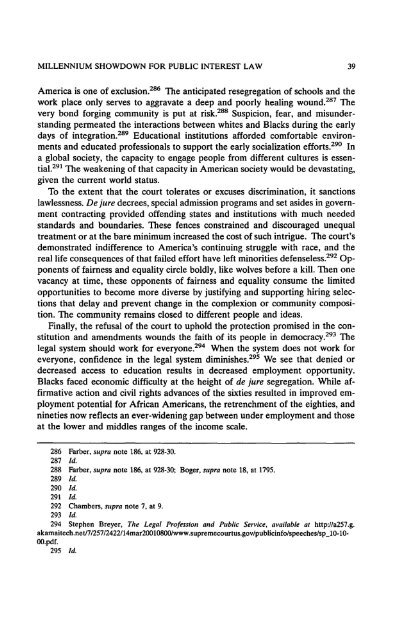Download Electronic Version - UDC Law Review
Download Electronic Version - UDC Law Review
Download Electronic Version - UDC Law Review
Create successful ePaper yourself
Turn your PDF publications into a flip-book with our unique Google optimized e-Paper software.
MILLENNIUM SHOWDOWN FOR PUBLIC INTEREST LAW 39<br />
America is one of exclusion. 286 The anticipated resegregation of schools and the<br />
work place only serves to aggravate a deep and poorly healing wound. 287 The<br />
very bond forging community is put at risk. 288 Suspicion, fear, and misunderstanding<br />
permeated the interactions between whites and Blacks during the early<br />
days of integration. 289 Educational institutions afforded comfortable environments<br />
and educated professionals to support the early socialization efforts. 290 In<br />
a global society, the capacity to engage people from different cultures is essentia1.<br />
291 The weakening of that capacity in American society would be devastating,<br />
given the current world status.<br />
To the extent that the court tolerates or excuses discrimination, it sanctions<br />
lawlessness. De jure decrees, special admission programs and set asides in government<br />
contracting provided offending states and institutions with much needed<br />
standards and boundaries. These fences constrained and discouraged unequal<br />
treatment or at the bare minimum increased the cost of such intrigue. The court's<br />
demonstrated indifference to America's continuing struggle with race, and the<br />
real life consequences of that failed effort have left minorities defenseless. 292 Opponents<br />
of fairness and equality circle boldly, like wolves before a kill. Then one<br />
vacancy at time, these opponents of fairness and equality consume the limited<br />
opportunities to become more diverse by justifying and supporting hiring selections<br />
that delay and prevent change in the complexion or community composition.<br />
The community remains closed to different people and ideas.<br />
Finally, the refusal of the court to uphold the protection promised in the constitution<br />
and amendments wounds the faith of its people in democracy.293 The<br />
legal system should work for everyone. 294 When the system does not work for<br />
everyone, confidence in the legal system diminishes. 295 We see that denied or<br />
decreased access to education results in decreased employment opportunity.<br />
Blacks faced economic difficulty at the height of de jure segregation. While affirmative<br />
action and civil rights advances of the sixties resulted in improved employment<br />
potential for African Americans, the retrenchment of the eighties, and<br />
nineties now reflects an ever-widening gap between under employment and those<br />
at the lower and middles ranges of the income scale.<br />
286 Farber, supra note 186, at 928-30.<br />
287 Id.<br />
288 Farber, supra note 186, at 928-30; Boger, supra note 18, at 1795.<br />
289 Id.<br />
290 Id.<br />
291 Id.<br />
292 Chambers, supra note 7, at 9.<br />
293 Id.<br />
294 Stephen Breyer, The Legal Profession and Public Service, available at http://a257.g.<br />
akamaitech.netl7!257!2422!14mar20010800!www .supremecourtus.gov!publicinfo!speeches!sp_10-1 0-<br />
OO.pdf.<br />
295 Id.














